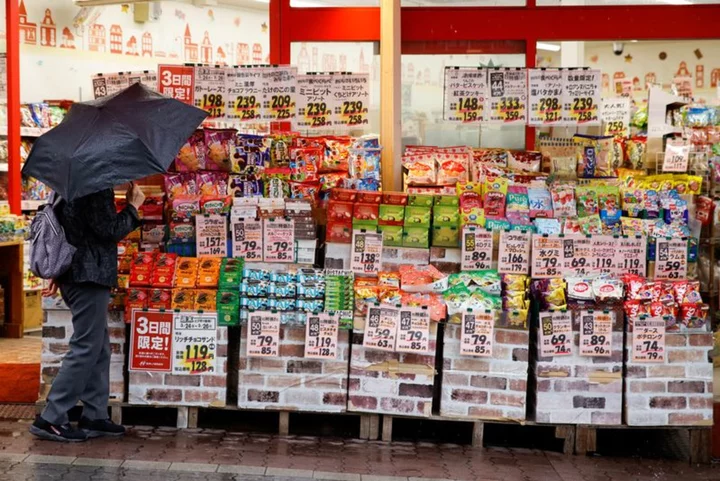By Takahiko Wada and Leika Kihara
TOKYO (Reuters) -Core inflation in Japan's capital slowed in September for the third straight month mainly on falling fuel costs, data showed on Friday, suggesting that cost-push pressures are starting to peak in a relief for the fragile economic recovery.
But separate data showed factory output was flat in August, a sign companies were feeling the pain from soft global demand and weak signs in China's economy.
The Tokyo core consumer price index (CPI), which excludes volatile fresh food but includes fuel costs, rose 2.5% in September from a year earlier, against a median market forecast for a 2.6% gain.
It slowed from a 2.8% increase in August but exceeded the Bank of Japan's 2% target for the 16th straight month.
An index that strips away both fresh food and fuel costs, which is closely watched by the BOJ as a better gauge of broad price trends, rose 3.8% in September from a year earlier after a 4.0% gain in August, the data showed.
While inflation is slowing, continued rises in food, daily necessities and service prices will likely keep the BOJ under pressure to phase out its massive stimulus, analysts say.
"Even though inflation is now moderating, it is doing so less quickly than the Bank of Japan had anticipated. Accordingly, the Board will need to revise up their inflation forecast for the current fiscal year further at their next meeting in October," said Marcel Thieliant, head of Asia-Pacific at Capital Economics.
"Our view is that the Bank will use the current window of opportunity to abandon negative interest rates and have pencilled in a rate hike in January next year."
A spike in global commodity prices last year drove many Japanese companies to shed their aversion to price hikes and pass on higher costs to households, keeping inflation above the BOJ's target for longer than policymakers initially expected.
The inflation overshoot led the BOJ to make modest tweaks to its bond yield control policy last month, a move investors saw as a shift away from decades of ultra-loose monetary policy.
But Governor Kazuo Ueda has ruled out the chance of an early exit from ultra-loose policy, saying that it needs to wait until wages rise enough to keep inflation sustainably around 2%.
Underscoring the fragile nature of Japan's export-reliant economy, factory output in August was flat as production for cars, steel goods and machinery fell.
Manufacturers surveyed by the Ministry of Economy, Trade and Industry expect output to rise 5.8% in September and increase 3.8% in October, the data showed on Friday.
(Reporting by Takahiko Wada and Leika Kihara; Additional reporting by Satoshi Sugiyama and Yoshifumi Takemoto; Editing by Sam Holmes)

